NewsBeat
Sara Sharif murder is ‘heartbreaking reminder’ of ‘profound weaknesses’ in child protection | UK News

We have been here before and each time we have said “never again”.
Reacting to the verdicts, the children’s commissioner for England Dame Rachel de Souza said the case highlights “profound weaknesses in our child protection system”.
In a statement, she said: “Even before she [Sara Sharif] was born, she was known to social care – and yet she fell off their radar so entirely that by the time she died, she was invisible to them all.”
“Sara was failed in the starkest terms by the safety net of services around her,” she added.
Verdicts latest:
Father and stepmother guilty of murder
Leading safeguarding expert Simon Bailey told Sky News about missed opportunities by authorities to intervene: “Quite clearly the system failed her because she tragically died at a very, very young age where all the indications are that it could have been averted.”
Mr Bailey, a former National Police Chiefs’ Council lead for child protection, blames “not enough professional curiosity” among social workers.
“Did they truly understand the significance of the harm that she was facing and that ultimately saw the appalling injuries that she sustained?” he asks. “Was information shared effectively?”
There had been previous allegations of abuse against both of Sara’s parents.
At birth in 2013 she was made the subject of a child protection plan, something that happens when children are deemed to be at risk.
The following year her parents separated. Sara was taken into foster care, before being returned first to her father, and then her mother, as each parent accused the other of abuse.
Four years later, in 2019, a battle in the family court led to Sara’s father, Urfan Sharif, being awarded custody.
Then, in March 2023, Sara’s school made a referral to Surrey social services. Teachers had become concerned about bruises on her face.
She’d given different explanations for them to two members of staff.
Read more:
Sara ‘never smiled once’ in months before death, jury told
Social workers contacted Sara’s father to tell him they were investigating, before running a multi-agency check on her background. The case was closed six days later.
Mr Bailey says that decision will need to be scrutinised.
“They should then have looked at the cumulative risk that Sara might have been exposed to, inevitably was being exposed to, and should then have been able to make a decision to mitigate those risks and considered what those child protection arrangements should look like,” he says.
That April, Sharif withdrew Sara from school. Months later she was dead.
The deaths of children who were known to social services have prompted major national reviews in recent years.
A report published the year before Sara’s death investigated the failures of social services in Solihull and Bradford to protect Arthur Labinjo Hughes, who died aged 7, and one-year-old Star Hobson.
Star’s family believe lessons don’t appear to have been learnt.
“How can this still keep on happening?” asks her great-grandfather David Fawcett.
“It’s been four years since we lost Star and I don’t even want to think about the number of children that have lost their lives in that four years,” her aunt, Alicia Szepler, tells Sky News.
Dr Ciaran Murphy, from the Association of Child Protection Professionals, says social workers are coming under increasing pressure.
“When practitioners are being faced with 40, 50, 60 cases a day, they are naturally going to be prioritising and there are going to be errors of judgement,” he says.
“The massive increase in demand has come about over the last 15 years, particularly because of cuts to public services and public spending, which meant that there are less services supporting families, more families are being pushed into the system, increased demand for social workers.
“One of the big issues that we have to confront is we are not investing enough in the child protection system in terms of monetary spending.”
Now the trial has concluded an independent safeguarding review will examine what more could have been done to protect Sara.
Rachael Wardell, the executive director responsible for children’s social services at Surrey County Council, said: “Sara’s death is incredibly distressing and we share in the profound horror at the terrible details that have emerged during the trial.
“We are resolute in our commitment to protecting children, and we are determined to play a full and active part in the forthcoming review alongside partner agencies to thoroughly understand the wider circumstances surrounding Sara’s tragic death.”
Ms de Souza has called for a series of reforms including “proper oversight” for children, like Sara, being home-schooled.
“We can have no more reviews, no more strategies, no more debate. When we say ‘never again’, we have to mean it – let that be Sara’s legacy,” she said.
NewsBeat
Judges who allowed Sara Sharif to remain in her father’s custody to be named next week
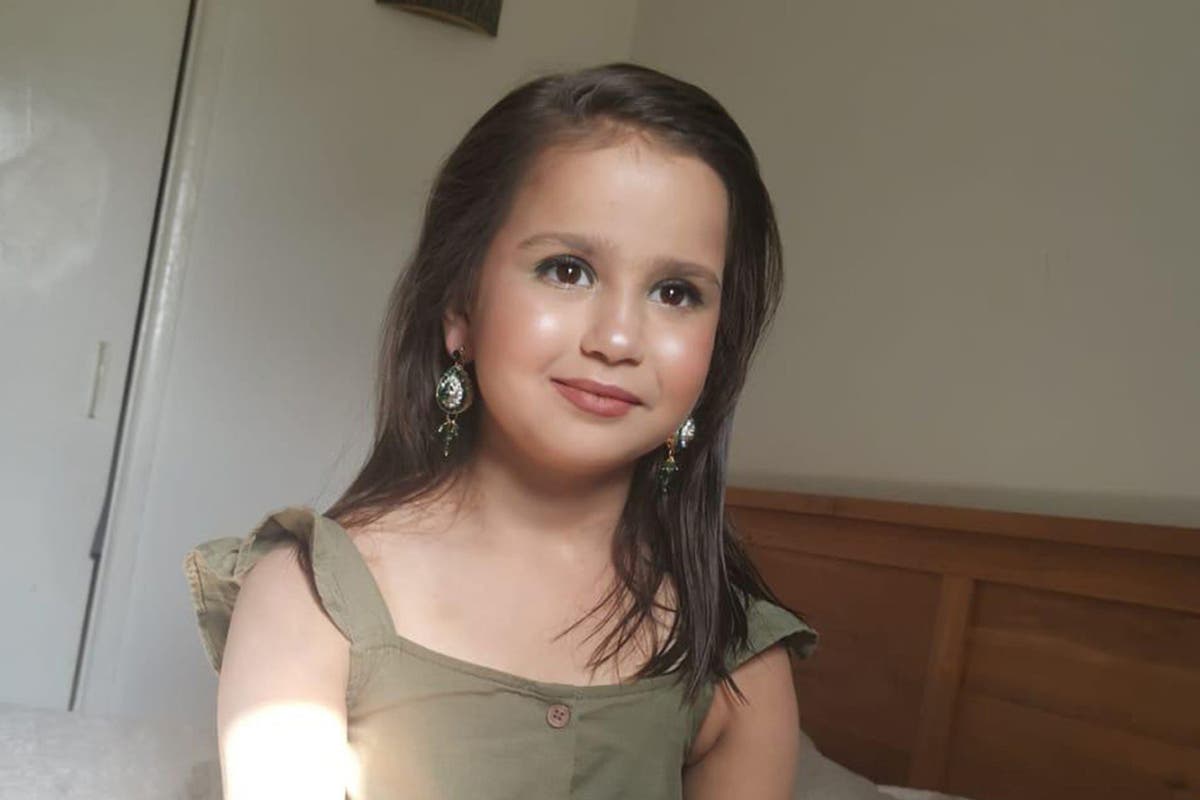
Three judges that oversaw Sara Sharif’s family court cases before she was murdered by her father and stepmother, can be named in seven days, a court has ruled.
The Court of Appeal has accepted an appeal after several media organisations challenged Mr Justice Williams’ controversial ruling that those who oversaw a string of family court proceedings before the 10-year-old’s death could not be identified.
Mr Justice Williams originally cited a “real risk” of harm to them from a “virtual lynch mob” as he said that to suggest family court officials should be held accountable for Sara’s death was “equivalent to holding the lookout on the Titanic responsible for its sinking”.
In the Court of Appeal’s ruling, Sir Geoffrey Vos said: “In the circumstances of this case, the judge had no jurisdiction to anonymise the historic judges either on 9 December 2024 or thereafter.”
A shocking trial saw Sara’s father, Urfan Sharif, 42, and his wife Beinash Batool 30, found guilty for her traumatic murder, after she suffered a catalogue of 70 injuries, including 25 fractures, human bite marks and burns. Her uncle, Faisal Malik, 29, was convicted for causing or allowing her death while living with them.
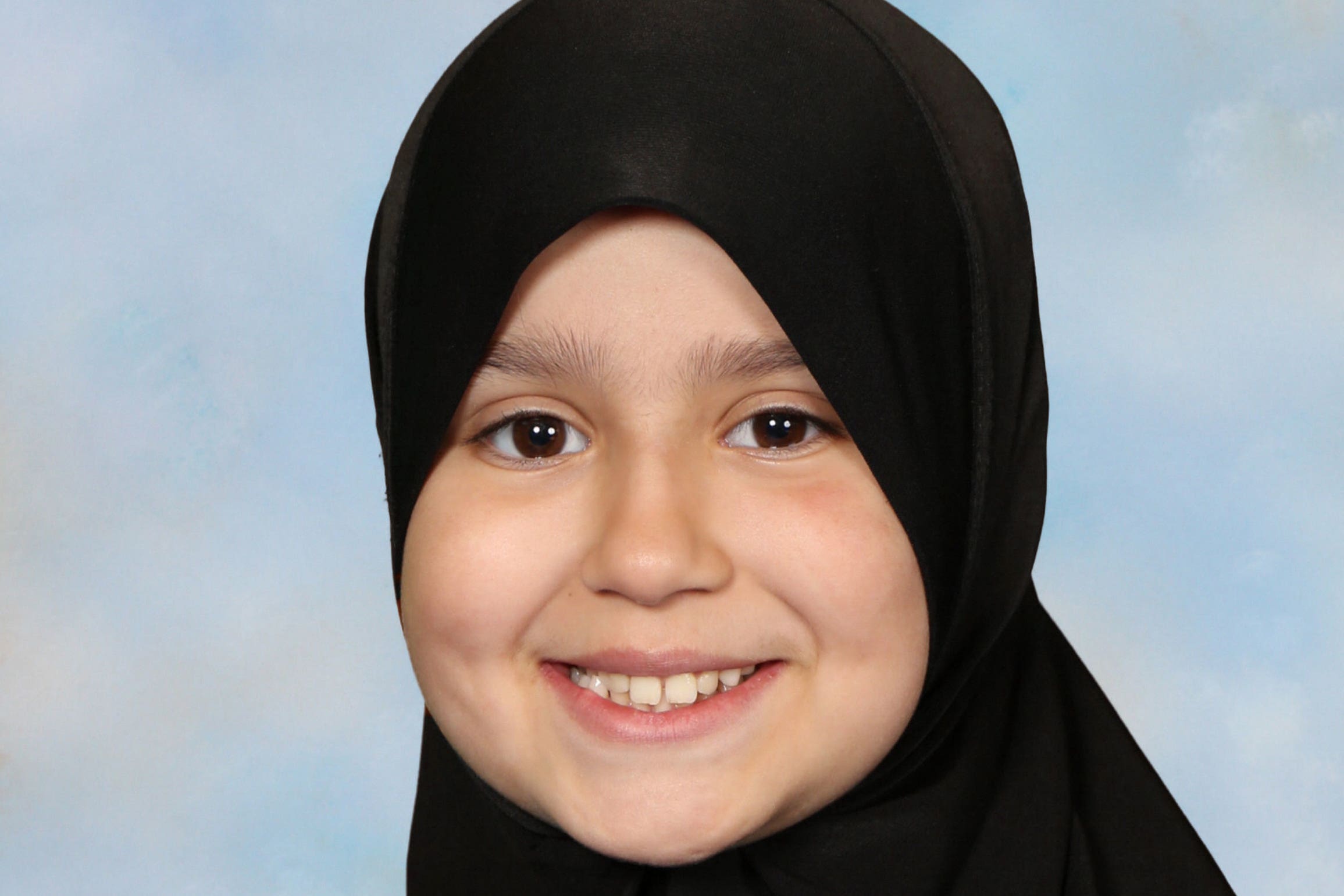
Details later emerged from previous family court proceedings, which revealed that Surrey County Council had repeatedly raised “significant concerns” about Sara’s safety.
The council first had contact with Sharif and Sara’s mother Olga Domin in 2010 – more than two years before Sara was born – having received “referrals indicative of neglect” relating to her two older siblings, known only as Z and U.
Within a week of Sara’s birth in 2013, the authority began care proceedings concerning the children.
Between 2013 and 2015, several allegations of abuse were made against Sharif and Domin, which were never tested in court despite three sets of family court proceedings.
One hearing in 2014 told that the council had “significant concerns” about the children returning to Sharif, “given the history of allegations of physical abuse of the children and domestic abuse with Mr Sharif as the perpetrator”.
Sara and her sibling U were returned to the parents. Sibling Z remained in foster care where they made allegations of physical abuse perpetrated by both parents, as well as allegations of domestic violence.

These allegations were denied by Sharif and Domin and the court did not determine the truth.
In 2015, Domin accused Sharif of hitting her and their children, as well as controlling, violent behaviour. He made counter-allegations against Domin and agreed to go on a domestic violence course, but these allegations were never tested in court.
Sara would briefly go into foster care and then join her mother in a refuge. While in foster care, a carer noted scars potentially consistent with cigarette burns on Sara and her sibling, which Domin and Sharif said were chicken pox scars.
By November that year, the family concluded the children should live with Domin, allowing supervised visits with Sharif.
In 2019, a judge approved Sara moving to live with her father at the home in Woking, after she alleged Domin had abused her, where she later died after a campaign of abuse.
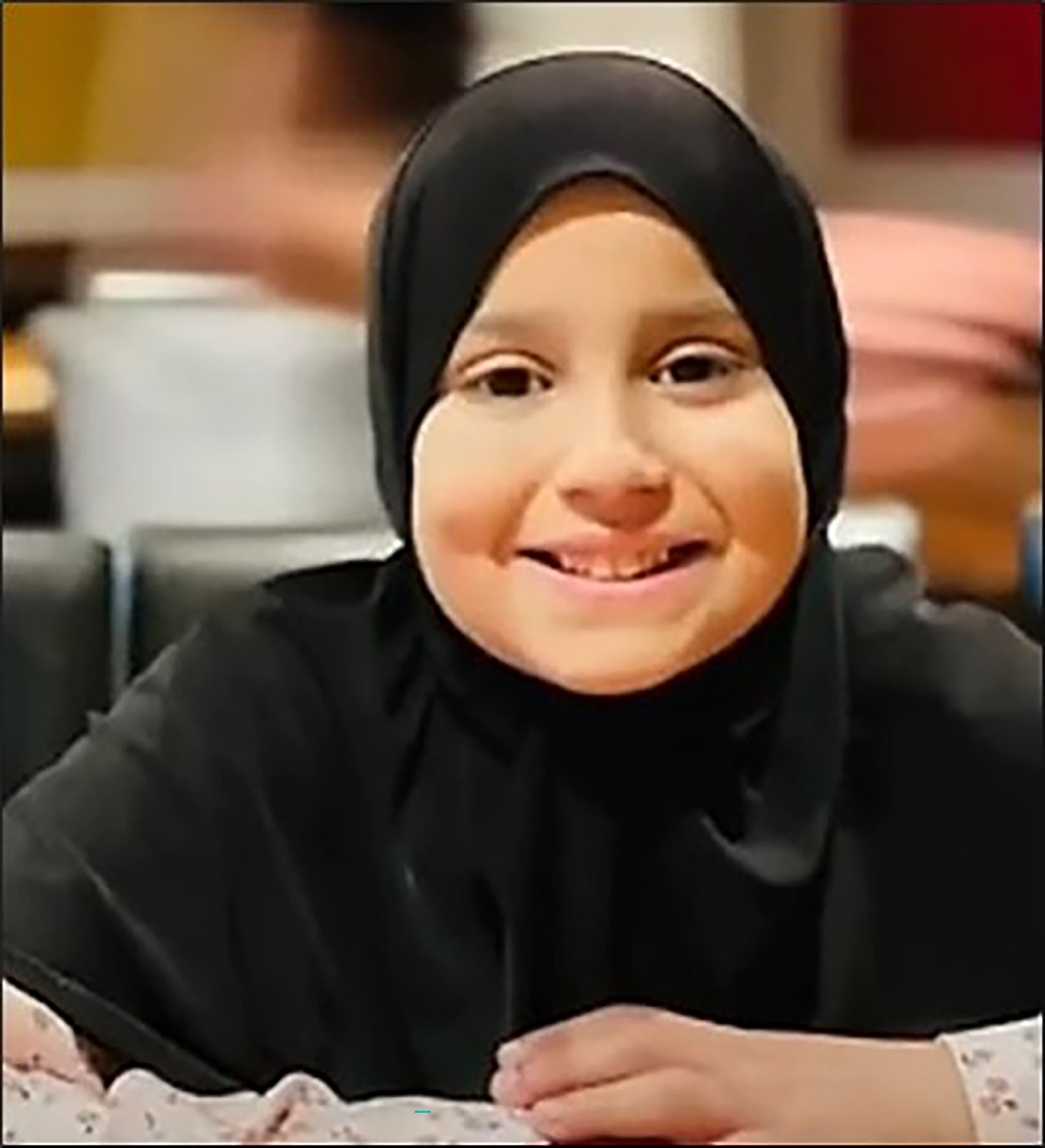
Freelance journalists Louise Tickle and Hannah Summers were two of many media figures who appealed the decision as they told a hearing on 14 January that the judges should be named in the interests of transparency.
Chris Barnes, for Ms Tickle and Ms Summers, called the judge’s decision “unfair, poorly reasoned and unsustainable”, calling it “out of step with the recognised need to promote transparency, and media reporting, in the Family Court”.
The children’s guardian, representing other minors involved in the case, opposed the appeal. Alex Verdan KC, representing the guardian, said the judge’s decision “would seem to be grounded on concern for the wellbeing of judges”.
“For many professionals working within the family justice system, particularly those in a judicial role, the risks are all too real, but all too infrequently acknowledged,” he added.
Cyrus Larizadeh KC, for Urfan Sharif, has also opposed the appeal, as he said in written submissions that he was “concerned that no harm should come to the judge(s) who presided in the historic proceedings”, citing that media reporting had led to “significant threats” being made to judges on social media.
More follows…
Politics
Labour MP says CPS made ‘right choice’ to charge Rudakubana with murder, not terrorism


Labour MP Mike Tapp has backed calls for a national review into terrorism laws following the sentencing of Southport killer Axel Rudakubana.
Speaking to GB News, the Dover MP said: “These people, without clear ideologies, who are obsessed with murder, we’ve got to get on top of it.”
NewsBeat
Hamas to name next Israeli hostages set to be released

Hamas is expected to hand over to Israel the names of four hostages to be released on Saturday under the Gaza ceasefire deal.
It is thought they will be soldiers and civilians, all female.
They will be freed in exchange for 180 Palestinian prisoners held in Israel.
It will be the second exchange since the ceasefire came into effect last Sunday. Three hostages and 90 prisoners were released in the first swap.
The ceasefire halted the war which began when Hamas attacked Israel on 7 October 2023. About 1,200 people were killed and 251 taken back to Gaza as hostages.
More than 47,200 Palestinians, the majority civilians, have been killed in Israel’s offensive, Gaza’s Hamas-run health ministry says.
Hamas is also expected to provide information about the remaining 26 hostages due to be released over the next five weeks.
This includes the Bibas family – two parents and two children, one of whom, Kfir, was 10 months old when taken captive and is the youngest hostage. It is unclear if this information will include the names or just the number of living or dead hostages.
The prisoners who will be released are of a more serious category than those freed in the first exchange. They will include those who have killed, some of whom are serving sentences of more than 15 years.
Israel has insisted that no-one who was involved in the 7 October attacks will be freed.
The ceasefire deal was reached after months of indirect negotiations between Israel and Hamas, led by the US, Qatar and Egypt.
It will be implemented in three stages, with the second stage due to begin six weeks into the truce. About 1,900 Palestinian prisoners will be released during the first stage in exchange for 33 hostages. Israeli forces will also begin withdrawing from positions in Gaza and hundreds of thousands of displaced Palestinians will be able to return to areas they had fled or been forced from.
The ceasefire is meant to lead to a permanent end to the war in Gaza.
Ninety-one hostages taken on 7 October 2023 are still held in Gaza. Fifty-seven of them are assumed by Israel to still be alive. Three others – two of whom are alive – have been held for a decade or more.
NewsBeat
Thousands of young men obsessed with violence, UK's most senior police officer warns


The UK’s most senior police officer has warned thousands of young men are obsessed with violence in the wake of the Southport killings.
NewsBeat
Storm Eowyn school closures: Find out which are shut near you amid rare red weather warnings

Thousands of schools have been closed on Friday as Storm Eowyn batters the country with winds of over 100mph.
The Met Office has issed two rare red weather warnings in Scotland and Northern Ireland, as Storm Eowyn is likely to damage buildings, uproot trees, cause power cuts, and bring a danger to life.
Elsewhere, every part of the UK is impacted by either a yellow or amber weather warning as many face disruption to their lives and journeys.
Pupils across the country have been told to stay at home, as Northern Ireland closes all of its schools and many in Scotland and Northumberland are forced to close.
The Met Office said winds would pick up rapidly during Friday morning’s rush hour, bringing peak gusts of 80-90mph, and up to 100mph along some exposed coasts.
A wind speed of 114mph brought by Storm Eowyn has been recorded in Ireland, the fastest since records began, forecaster Met Eireann said.
Police said no road users should travel in or to the red weather warning area, and motorists there were advised not to drive unless absolutely essential.

Some 4.5 million people received emergency alerts on their phones warning of the incoming storm in the “largest real life use of the tool to date” on Thursday.
Parents are urged to check with on their children’s school websites in the morning, with information also posted on council sites and on local radio stations.
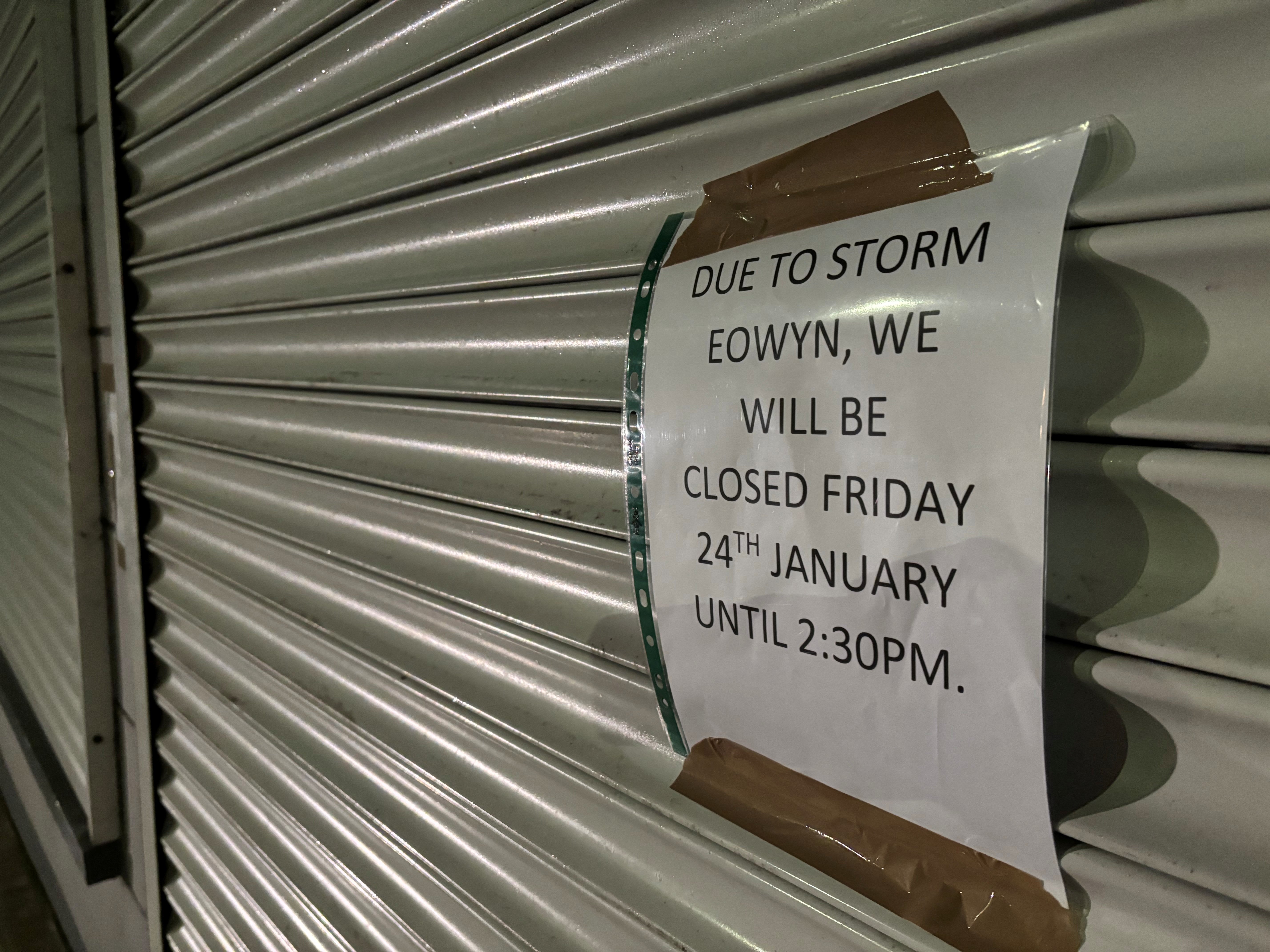
Here is a list of likely affected council websites The Independent has compiled:
Northern Ireland
All schools in Northern Ireland are to close on Friday.
Scotland
All schools in the following areas are closed on Friday:
- Glasgow City
- East Ayrshire
- North Ayrshire
- South Ayrshire
- West Lothian
- East Lothian
- West Dunbartonshire
- East Dunbartonshire Council
- Midlothian
- Inverclyde
- South Lanarkshire
- North Lanarkshire
- Argyll and Bute
- East Renfrewshire
- Renfrewshire
- City of Edinburgh
- Dundee
- Falkirk
- Fife
- Perth and Kinross
- Scottish Borders
- Western Isles
- Stirling
- Clackmannanshire
- Dumfries and Galloway
With Aberdeenshire under yellow and amber warnings for snow and wind, here is the link to their local council website to find out which schools are closed – https://online.aberdeenshire.gov.uk/school-closures
Several schools in the Scottish Highlands were also closed, with a full list for Friday available here – https://www.highland.gov.uk/schoolclosures
The Scottish government also has an online directory here for you to search if your child’s school is closed – https://www.mygov.scot/school-closures
Wales
In Anglesey, dozens of schools are closed due to high winds. You can check the list on their website here – https://www.anglesey.gov.wales/en/Residents/Community-Safety/Weather-warning-24-January-2025.aspx
England
A number of schools are closed in Northumberland, which is under a yellow and amber warning on Friday. The full list of closures will be updated here – https://www.northumberland.gov.uk/Alerts
In Cumberland, seven schools have been closed so far on Friday. With a full list for Friday available here – https://www.cumberland.gov.uk/schools-and-education/school-closures
Politics
Labour MP Mike Tapp backs national review into terrorism legal framework after sentencing

Labour MP Mike Tapp has backed calls for a national review into terrorism laws following the sentencing of Southport killer Axel Rudakubana.
Speaking to GB News, the Dover MP said: “These people, without clear ideologies, who are obsessed with murder, we’ve got to get on top of it.”
Rudakubana 18, was sentenced to a minimum of 52 years in prison for the murders of three young girls at a Taylor Swift-themed class in Southport in July 2024.
However, Mr Justice Goose confirmed the offences he had committed “did not reach the legal definition of terrorism”, because he did not kill to further a political, religious or ideological cause.

Tapp defended the CPS’s decision to not charge Rudakubana with terrorism
GB News / PA
Speaking to the People’s Channel, Tapp stressed that the review would examine everything “from the first referral to the last” to understand how Rudakubana “slipped through the net”.
“I think this started happening when he was a very young age. So possession of knives, obsession with murder, the vile things he’s been viewing online,” he said.
Defending the decision of the Crown Prosecution Service’s to pursue murder charges rather than terrorism offences in the case, Tapp noted that the CPS “have to charge with the offence they’re most likely to convict on”.
He explained: “If there isn’t that clear evidence of that motivation and ideology leading to those viral murders, they’ve got to go with the one that’s most likely to succeed.

Rudakubana, 18, was sentenced to a minimum term of 52 years in prison on Thursday
PA
“So that was most likely the right choice here, and that’s why we’ve seen him convicted.”
LATEST DEVELOPMENTS:
He explained that while Rudakubana “is clearly a terrorist,” prosecutors faced challenges with proving ideological motivation.
“The complex part here is, yes, he killed people, and that was vile. He terrorised, he had an al Qaeda manual, he produced ricin,” Tapp said.
“But the CPS made a decision to charge on murder because there wasn’t that clear ideological motivation for carrying out the murders.”
The Labour MP emphasised that careful consideration of charges was essential to secure a conviction.

Tapp told GB News that there wasn’t a ‘clear enough motivation’ for the CPS to charge Rudakubana on
GB News
Tapp emphasised the importance of careful language during legal proceedings to ensure successful prosecutions. “If we say the wrong things for political reasons that jeopardise a case like that, that would be disgraceful,” he said.
The Dover MP acknowledged the dedication of counter-terrorism officers, noting that many attacks have been prevented.
“Having worked in counter terrorism, we’ve really committed counter officers, people are working tirelessly to stop attacks from happening,” he told GB News.
Tapp also stressed that while many attacks were prevented, this case represented one that “slipped through the net, which is an absolute tragedy”.
NewsBeat
Appeal won to name girl’s family court judges
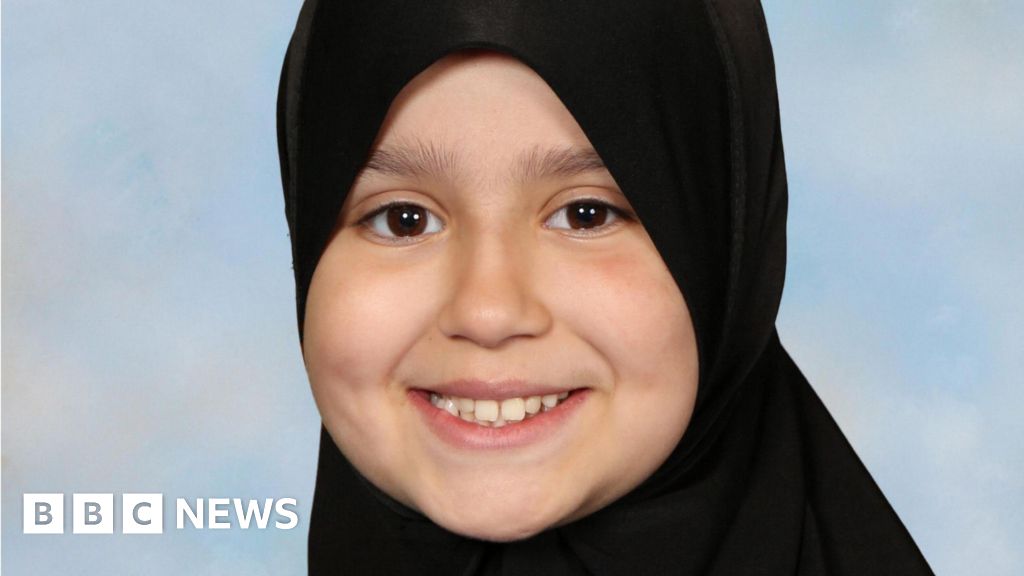
BBC News, South East
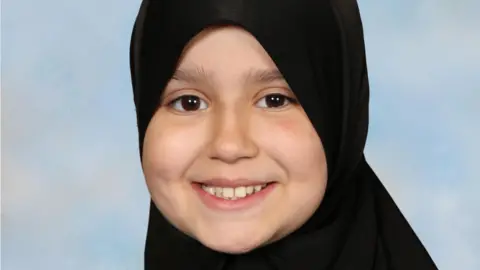 Surrey Police
Surrey PoliceThree judges who oversaw family court proceedings related to the care of Sara Sharif before she was murdered will be named next week, the Court of Appeal has ruled.
Mr Justice Williams ruled in December that the media could not name the judges involved in the historical family court cases related to the 10-year-old, as well as social workers and guardians, due to a “real risk” of harm from a “virtual lynch mob”.
However, several media organisations, including the BBC, have successfully appealed against the decision, previously telling a hearing that the judges should be named in the interests of transparency.
Sara’s father Urfan Sharif, 43, and stepmother Beinash Batool, 30, were jailed for life for her murder in Woking in 2023.
At a ruling on Friday, the Court of Appeal ruled that the three unnamed judges could be identified in seven days.
Sir Geoffrey Vos said: “In the circumstances of this case, the judge had no jurisdiction to anonymise the historic judges either on 9 December 2024 or thereafter.
“He was wrong to do so.”
Following the convictions at the Old Bailey in December last year, details from previous family court proceedings could be published relating to Sara’s care before her death.
This included that Surrey County Council (SCC) repeatedly raised “significant concerns” about the children returning to Sharif, “given the history of allegations of physical abuse of the children and domestic abuse with Mr Sharif as the perpetrator”.
 Surrey Police
Surrey PoliceDocuments released to the media showed that SCC first had contact with Sharif and Sara’s mother, Olga Sharif, in 2010 – more than two years before Sara was born – having received “referrals indicative of neglect” relating to her two older siblings.
The authority began care proceedings concerning the siblings in January 2013, involving Sara within a week of her birth.
Between 2013 and 2015, several allegations of abuse were made that were never tested in court.
In 2019, a judge approved Sara moving to live with her father in Woking. It was there that she was hooded, burned and beaten during years of abuse before her death.
SCC said the appeal should be allowed.
Sharif was sentenced to a minimum of 40 years in prison for murder, while Batool received a minimum of 33 years.
Sara’s uncle, Faisal Malik, 29, was sentenced to 16 years’ imprisonment for causing or allowing her death.
NewsBeat
French woman who stopped having sex with her husband wins appeal over divorce | World News


A French woman who stopped having sex with her husband has won an appeal in Europe’s highest court after being told she was at fault for their divorce.
Identified as H.W., the woman filed for divorce against her husband in 2012 and claimed he had been bad-tempered, violent and abusive. They had four children together.
H.W. said she stopped having sex with her husband in 2004 over health problems and threats of violence. He then counterclaimed that she failed to fulfil her marital duties and made slanderous accusations against him.
In 2019, the woman was told by a French appeals court that her refusal to have sex with him was a breach of her marital duty and ruled she was responsible for the breakdown of the marriage.
Almost six years later, the European Court of Human Rights (ECHR) ruled the French court was wrong to do so, and condemned it for violating H.W.’s right to respect for private and family life.
It said on Thursday that it “could not identify any reason capable of justifying this interference by the public authorities in the area of sexuality”, and that any concept of marital duties needed to take consent into account.
“In the Court’s view, consent to marriage could not imply consent to future sexual relations,” the ECHR said. “Such an interpretation would be tantamount to denying that marital rape was reprehensible in nature.”
The ECHR added it “concluded that the very existence of such a marital obligation ran counter to sexual freedom” and to France’s obligation to combat domestic and sexual violence.
Read more from Sky News:
Storm Eowyn: Record winds of 114mph recorded
Axel Rudakubana’s ‘unduly lenient’ sentence to be reviewed
In a statement released by lawyer Lilia Mhissen, H.W. said she hopes the decision will “mark a turning point in the fight for women’s rights in France”.
“It is now imperative that France, like other European countries, such as Portugal or Spain, take concrete measures to eradicate this rape culture and promote a true culture of consent and mutual respect,” she added.
While the ruling has no impact on the divorce, Ms Mhissen said it will prevent French judges from making similar divorce rulings in the future.
H.W., who was born in 1955, brought the appeal to the ECHR in 2021 after exhausting her legal options in France.
A diplomatic source told Reuters that the French parliament is currently considering a new law that would modify the legal definition of rape.
NewsBeat
Judges who oversaw family court proceedings related to care of Sara Sharif can be named | UK News


Three judges who oversaw family court proceedings related to the care of Sara Sharif can be named next week, the Court of Appeal has ruled.
Mr Justice Williams issued a ruling last year that the three judges involved in the historical family court cases related to the 10-year-old, as well as social workers and guardians, could not be named due to a “real risk” of harm from a “virtual lynch mob”.
News organisations had previously appealed against Mr Williams’s decision on the grounds of transparency about the court case relating to 10-year-old Sara, who was murdered by her father and stepmother.
Sir Geoffrey Vos said on Friday: “In the circumstances of this case, the judge had no jurisdiction to anonymise the historic judges either on 9 December 2024 or thereafter. He was wrong to do so.”
Earlier this month, the Court of Appeal heard the judges who oversaw court proceedings had “serious concerns” about the risks posed to them and their families if they were named.
Mr Justice Williams previously argued that holding individuals involved in those proceedings was “equivalent to holding the lookout on the Titanic responsible for its sinking”.
Sharif and Sara’s stepmother, Beinash Batool, were jailed for life in December for years of horrific “torture” and “despicable” abuse that led to her murder.
This breaking news story is being updated and more details will be published shortly.
Please refresh the page for the fullest version.
You can receive breaking news alerts on a smartphone or tablet via the Sky News app. You can also follow us on WhatsApp and subscribe to our YouTube channel to keep up with the latest news.
NewsBeat
Why this British seaside destination makes the perfect winter break

A sinister laugh resounds from the floor to the rafters of Britain’s oldest static circus building, telling us instantly that we’re in for a thriller.
The hisses and boos of the audience echo loudly around the majestic Hippodrome in Great Yarmouth when Mr Mullins, the evil fairground owner, lays out his fiendish plans to capture local heroes Jack Jay and Johnny Mac.
The Hippodrome is the country’s last remaining venue constructed entirely for circus, an historic building brought to life through it’s joyful performers.
My five-year-old daughter cowers in fear watching death-defying stunts by acrobats suspended mid-air. Moments later my nine-year-old falls back into her seat in fits of giggles over jokes meant to entertain the adults in the audience.

Read more: The best spa hotels in the Cotswolds
We watch in awe as a contortionist squeezes herself into a small box, clap with delight at a seemingly impossible aerial stunt and cheer loudly when doltish Johnny saves the day and stops the villainous Mullins – played bewitchingly by James Franklin.
After the superb show we stroll through the belly of the historic building to its museum, which is home to props and posters of bygone years. The artefacts – some more than 120 years old – conjure images of the hundreds of shows enjoyed before ours.
In 1903, when the Hippodrome was built, Great Yarmouth was a popular summer seaside destination and has been ever since. But on a winter short break with my family, I’m eager to discover its winter charms.

Read more: The best Lake District hotels
Our home away from home during our trip to Norfolk is Rose Cottage, a cosy gem tucked away in the quaint village of Winterton-on-Sea, a 20-minute drive north along the coast from Great Yarmouth. A log burner at the heart of the snug living room is perfect for cooler evenings.
Up to four guests can stay across the two comfortable bedrooms and four-legged friends are also welcome at the self-catering cottage, which lies just a stone’s throw away from Winterton’s sandy beaches.
At the beach, the sun blazes down on miles and miles of golden sand, stretching as far as the eye can see. Families play with pet dogs, horse riders pootle along the shoreline, while nature enthusiasts gather with binoculars, keenly trying to spot grey seals.
While traversing around this beautiful corner of East Anglia you can’t help but trip over important historic sites. After a delicious Sunday roast at Branford’s restaurant in Caister-on-Sea, we spot a small sign pointing to Caister Roman Fort. Intrigued, we pull into a lay-by and walk into what looks like a small park but is actually the ruins of a fort.

In some parts of the world there would be a hefty price tag to see this large display of Roman history – thought to be part of a chain of coastal forts along what the Romans knew as the ‘Saxon Shore’ – but we have the whole site to ourselves to explore for free.
Inspired by the area’s many wildlife watchers, we head to Horsey Gap to do some grey seal spotting. During the late autumn and winter, these shores belong to a huge colony of seals during pupping season.
Read more: What’s so jolly about Woodbridge? I travelled to ‘the happiest place in the UK’ to find out
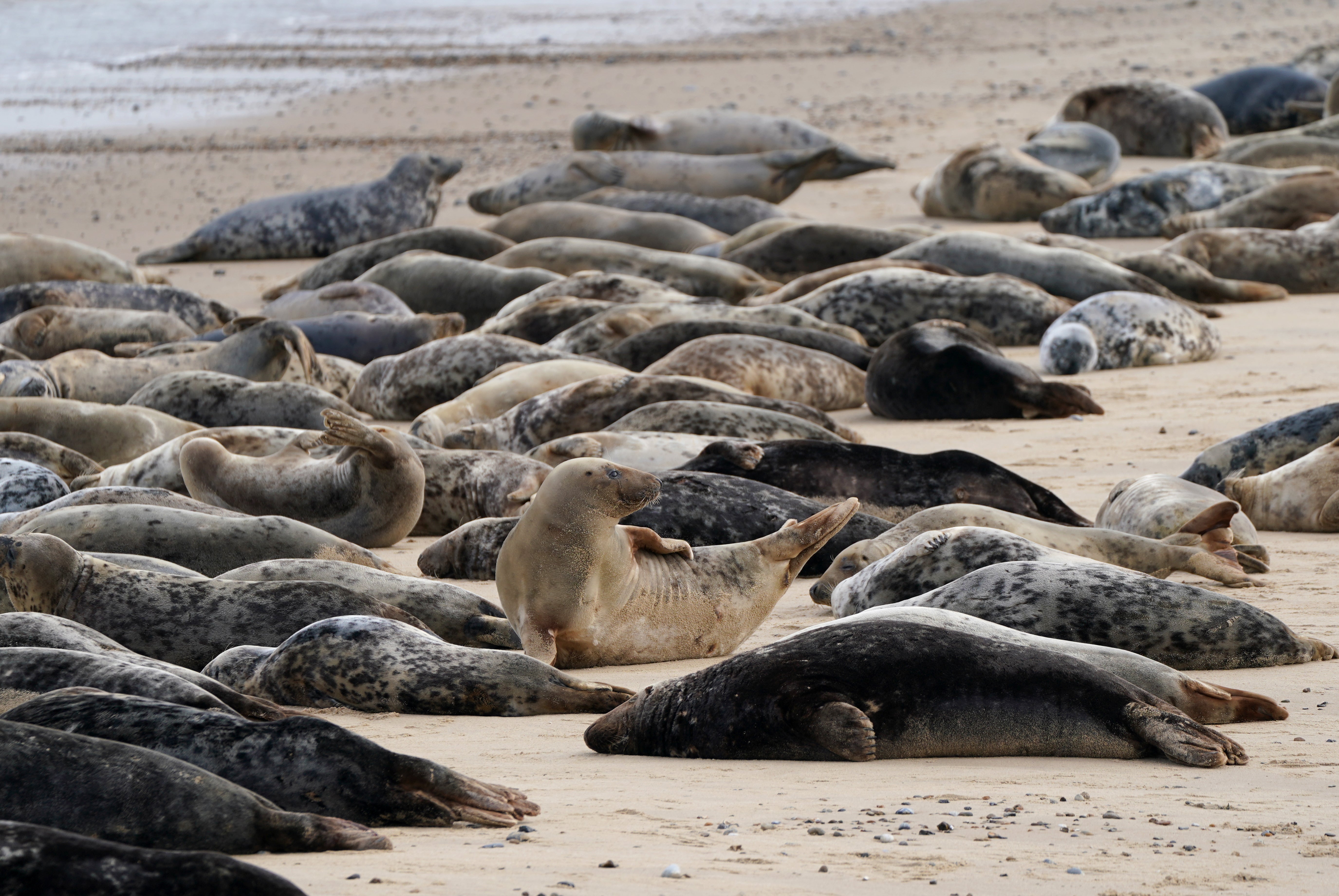
We watch awe-struck as hundreds of seals lounge along the coastline. A handful frolic in the foam as a friendly warden gives us more information about seals in Horsey.
“There’s 250 on this groin, around 200 on the next and I’m not sure about further on,” she tells me. “But it’s still early in the season, soon there will be thousands.”
We only spot two snow-white seal pups during our trip, but are told that within a few weeks there will be hundreds.
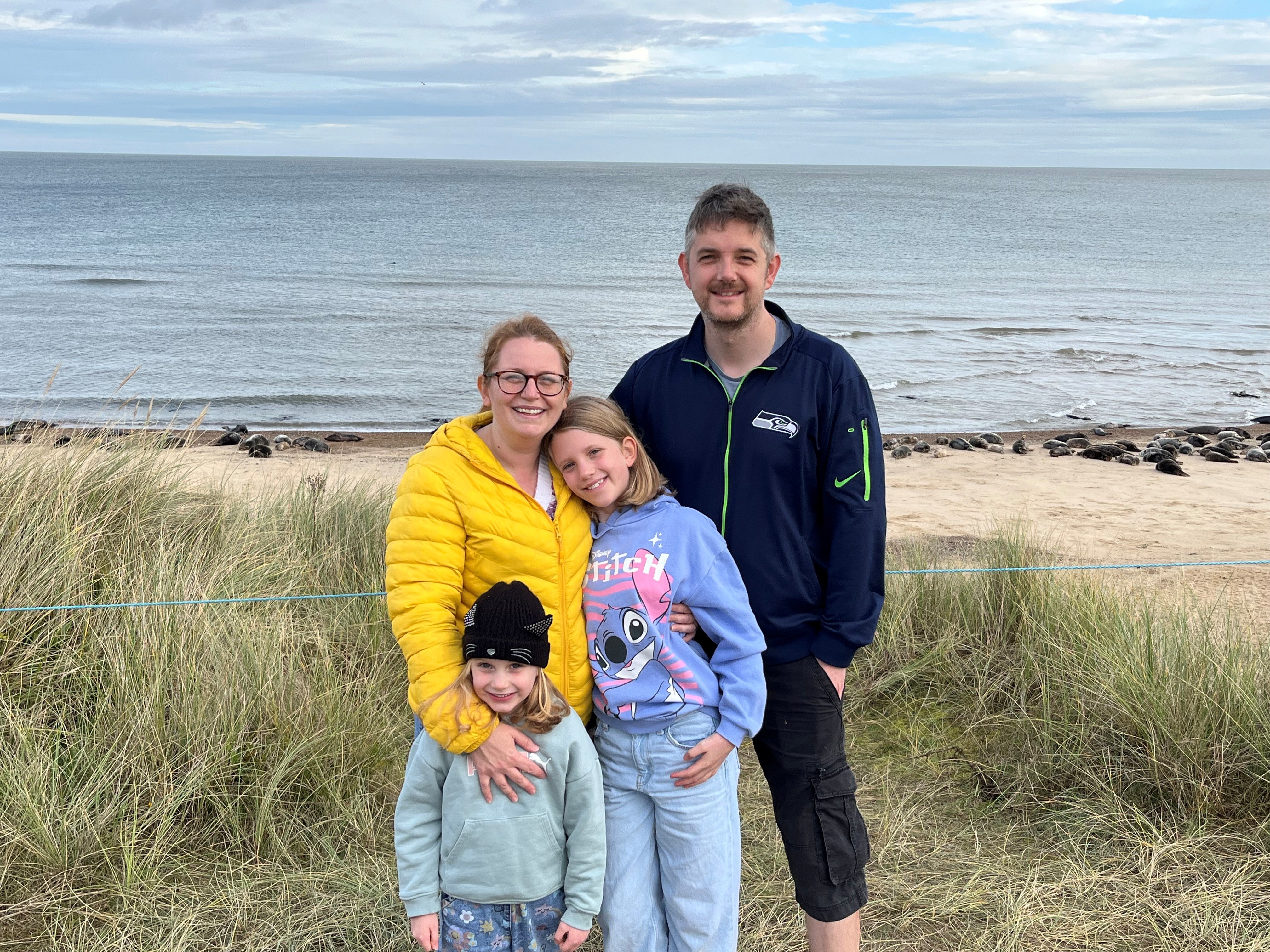
A short distance away, Great Yarmouth offers all the frivolity that one would expect at a British seaside town. Our first stop is the Time and Tide Museum, offering an interactive look through the history of the coastal town. The museum, set in an old fish curing site, tells the story of Great Yarmouth and its herring industry and still has the lingering aroma of a smokehouse.
Next we take a leisurely stroll though The Venetian Waterways, home to winding canals snaking through ornamental gardens, with interlinking walkways and islands to explore. Feeling adventurous, we decide to take a pedalo out on the boating lake, letting the children take it in turns to steer until a near-miss at the lake’s bubbling fountain.

After a spot of exercise we get some lunch at the nearby four-star Imperial Hotel, taking in views from the Terrace Restaurant which span for miles. We watch boats slowly chug past as we order haddock and chips with a delicious malt vinegar jam.
After lunch we really get stuck into seaside antics, taking a stroll through the charming Merrivale Model Village before heading to the dizzy heights of the Pleasure Beach. I particularly enjoy a stomach-flipping ride on the traditional wooden rollercoaster, which opened almost a century ago.
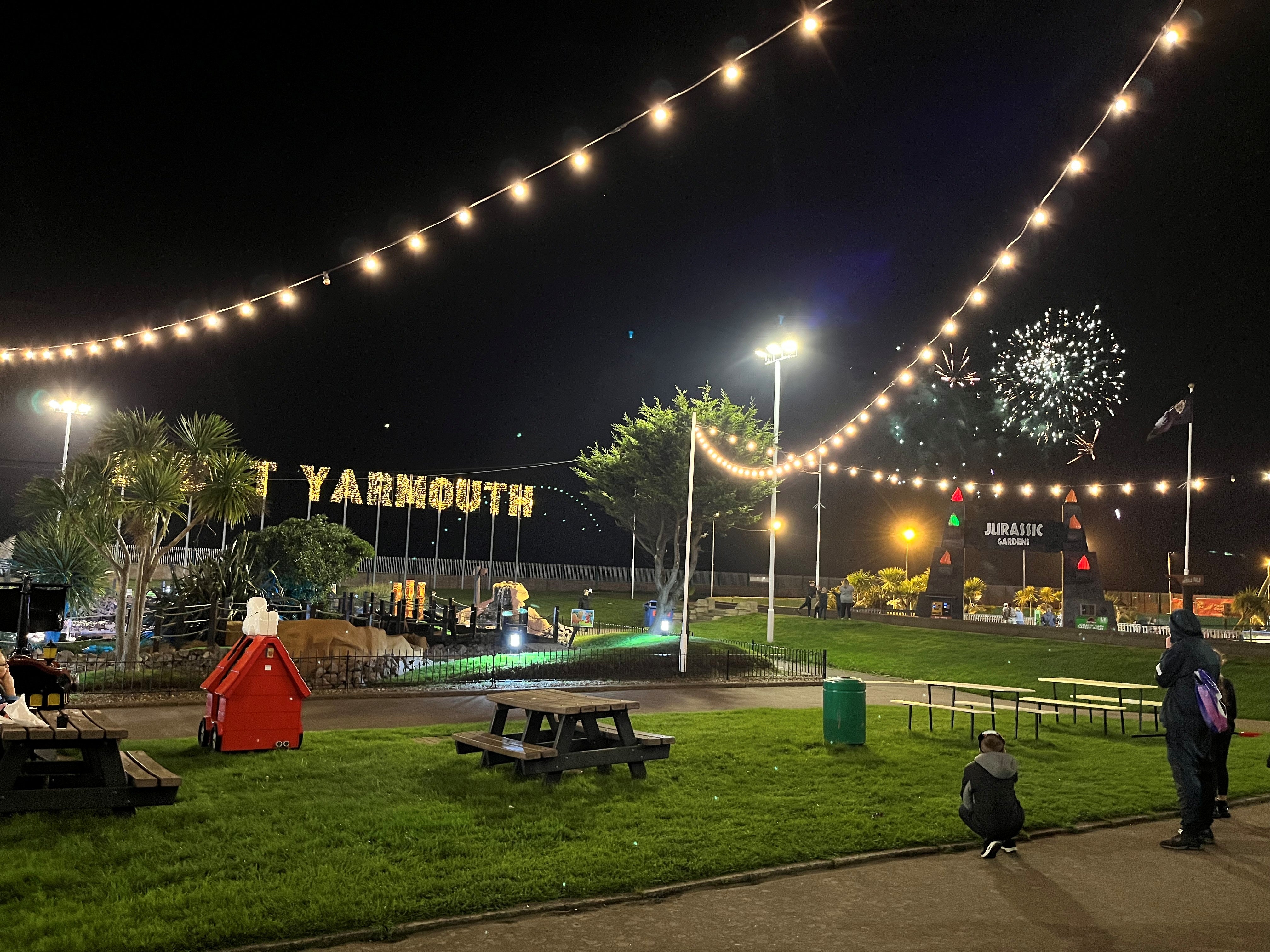
The children meanwhile are enthralled by some of the traditional fairground rides and games, and when offered the chance for ‘one last ride’ they choose the YoYo – a merry-go style ride with swings suspended in the air.
The children are also overjoyed to explore Great Yarmouth’s Sea Life centre, where highlights include the mesmerising jelly fish, waddling penguins and a colony of ants which busy themselves around visitors. My husband anxiously points out that one of the ants has escaped, only to be told to look up at thousands navigating purpose-built ant highways a few feet above our heads.
Our visit ends with an unexpected firework display near the Pleasure Beach, with golden stars and loud bangs seeing out the end to a fabulous break on the Norfolk coast.
How to do it
A week’s stay at Rose Cottage from £552.60; wintertoncottages.co.uk
For more information on the destination, go to visitgreatyarmouth.co.uk
-

 Fashion8 years ago
Fashion8 years agoThese ’90s fashion trends are making a comeback in 2025
-

 Entertainment8 years ago
Entertainment8 years agoThe Season 9 ‘ Game of Thrones’ is here.
-

 Fashion8 years ago
Fashion8 years ago9 spring/summer 2025 fashion trends to know for next season
-

 Entertainment8 years ago
Entertainment8 years agoThe old and New Edition cast comes together to perform You’re Not My Kind of Girl.
-

 Sports8 years ago
Sports8 years agoEthical Hacker: “I’ll Show You Why Google Has Just Shut Down Their Quantum Chip”
-
Business8 years ago
Uber and Lyft are finally available in all of New York State
-
Entertainment8 years ago
Disney’s live-action Aladdin finally finds its stars
-
Sports8 years ago
Steph Curry finally got the contract he deserves from the Warriors
-
Entertainment8 years ago
Mod turns ‘Counter-Strike’ into a ‘Tekken’ clone with fighting chickens
-
Fashion8 years ago
Your comprehensive guide to this fall’s biggest trends






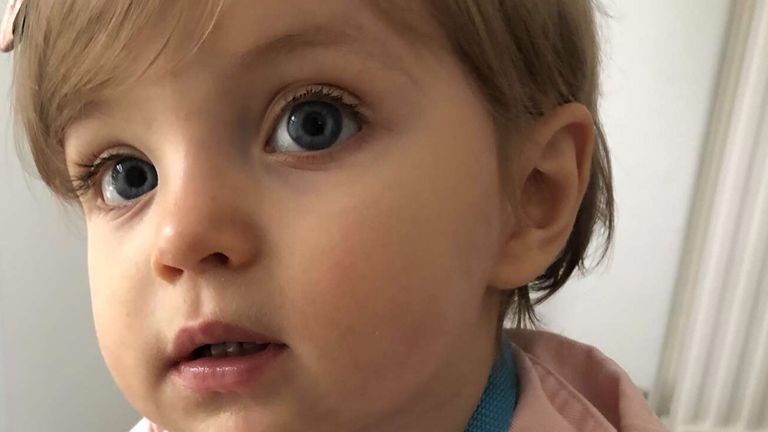







You must be logged in to post a comment Login